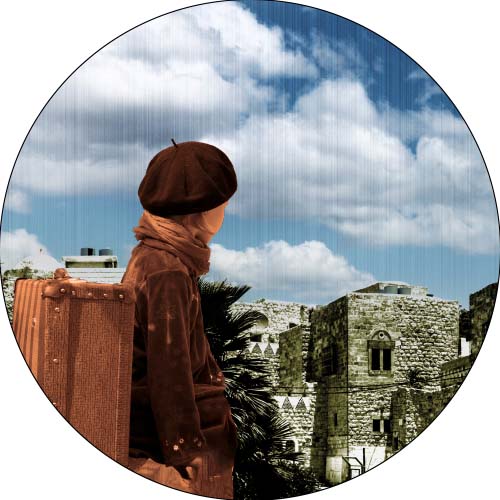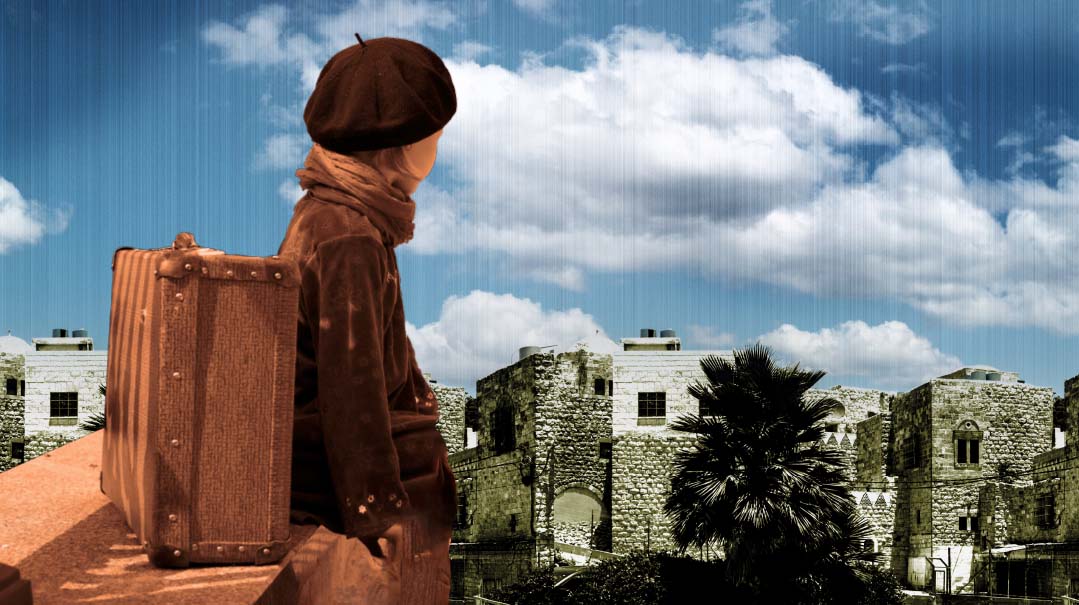Building Dreams: Chapter 4
| March 8, 2022I decided to give voice to the question. “But why did the yeshivah have to move here?”

Elka
Idragged my feet down the bumpy path after school that day. School was fun. Maybe exciting, sort of. At least, in the beginning it had been. But now, I wasn’t so sure. Time was passing, but things weren’t really changing. And after so many weeks, being the new girl wasn’t exciting anymore. When our apartment finally came into view, I knew what I needed. Mama. Mama could help me figure this all out.
“Mama,” I cried the moment I walked through the door, “I need a best friend.”
“Okay,” Mama said, turning toward me to greet me. But I had no time for questions about how my day was. This was much more important.
“Really, Mama,” I said emphatically, sitting down at the kitchen table and resting my face on my hands, “Miriam already has two best friends.”
“Elka, you have so many friends already,” Mama replied, plunking a basket of tomatoes and a bowl of water down in front of me. “Here. Can you wash these?”
I reached for the basket. “Jamal came around today?” It wasn’t really a question. When there were tomatoes, Jamal was here. Sure, there was the market, and we could buy lots of things there, but there were also a lot of Arab men who came around with all the fresh stuff. Tomatoes. Cucumbers. There was even an Arab man who walked around with his goats, and he would milk a little brown one right into Mama’s bucket every day.
Mama nodded. “Thank you.”
“But Mama,” I continued, my hands rinsing off the dirt on a tomato, “I don’t have a best friend. I’m just friends with everyone.”
“That’s also a good thing, Elka,” Mama sat down across from me and started rinsing off the eggs. “A best friend takes a lot of time. You’ve only been in their class for a few weeks.”
“But Miriam— “
“Miriam only has two girls her age,” Mama pointed out. “Of course they became best friends fast.”
“I used to have a best friend,” I grumbled, reaching for the last tomato to rinse it off, “before we came here.”
Mama stopped washing the eggs and looked at me hard. “Were you happier in Kovno?” she finally asked.
I looked down . Was I happier in Kovno? No one had asked me that question. No one ever wanted to know if I was happy. Not in the years Papa was in Chevron while we stayed in Kovno, not when we traveled, not even when we got here. “I — well, everything was different there,” I finally answered.
“It was,” Mama agreed. Then she got quiet, waiting.
“And — and I had Faiga and Bracha, and we had such a good time together.”
“You did have wonderful friends,” Mama agreed. “But look how lucky we are to be here. Why did we come here, Elka?”
I looked at Mama, thinking. I knew why we came. Everyone in our family knew how special we were, how lucky, because our Papa learned in the Alter’s yeshivah. Even Bracha and Faiga knew that my Papa was important. Whenever we had a question, we’d always save it to ask Papa. And then one day, Papa came home and told us that the whole yeshivah was going to be moving to Eretz Yisrael. But—
I decided to give voice to the question. “But why did the yeshivah have to move here?”
“We didn’t decide that the yeshivah was going to move,” Mama reminded me, “we just decided to follow it.”
I grimaced. “Couldn’t Papa have chosen somewhere else to learn? And then we wouldn’t have to go so far away, and I would still have my friends?”
At that moment, Miriam and Leiba traipsed into the house. Leiba was crying and her dress and legs and face and everything were covered with mud, so Mama took her to the bathroom to wash her up, and there went the rest of that conversation.
“Are you happy we moved here?” I asked Miriam, who was just standing there, staring at me.
She shrugged. “I think so. And here we have Papa.” Then she followed Mama toward the bathroom to see what was happening.
I stared after her for a few seconds, and then tore my eyes away from the closed bathroom door. It was useless, talking about these things with Miriam. She was such a baby, anyway. Stomping outside, I banged my boots against the muddy, rocky street, hoping it would make a loud thwacking sound. But it didn’t. Instead, my boot got stuck in a big glob of mud. Uch. I pulled at my foot, trying to get it free. But it would n ot come out. I looked down at my foot, stuck in the mud, unable to move. I was stuck. Stuck in this mud, stuck in this city, in this country, without any real friends. In a dumb place where even the roads made me stuck. Hot tears began to course down my face, sliding off my cheeks and mixing with the mud beneath my feet. Why did we even have to come here?
Dovid
The walk home from the yeshivah wasn’t very long, but my stomach was rumbling, and all I could think about was the warm food Mama had probably prepared for me. Papa always took his lunch in a bag and went straight to the shop, but I came home.
At first, Papa had told me that I would be learning in the regular Talmud Torah here. But then he changed his mind. I would be learning with the melamed who taught the other boys whose fathers learned in the yeshivah. It was really exciting in the beginning. It still is, but now it’s also really hard. I’ll be turning ten after Pesach, which is younger than all the other boys. And they’re all so big and mature. No pranks. No silliness. The yeshivah is a serious place.
As I walked down the path home, I wondered what this afternoon would look like. Finally, one of the bochurim had agreed to learn with me. Me! Okay, he said it would only be for half an hour, but still. I’d be learning with a bochur. I felt like singing, and, as a matter of fact, I was about to start humming to myself when I almost bumped into Elka.
“Elka?” I asked, “why are you standing here?”
She looked up at me, her eyes all red and full of tears. “Why did we even come here?” she bawled.
“Where?” I asked, confused. Looking down, I noticed her foot was stuck in the mud. “Do you need help getting your foot out?” I pointed downwards.
She nodded, tears still rolling down her face.
“Here,” I said, handing her my school bag. Then I bent down and gently wriggled her foot free. That’s what big brothers are for, after all. I looked at her, waiting for her to sing my praises and thank me again and again. But why would I expect that? This was Elka, after all. When had she ever thought I was great for doing anything? Still, I was surprised to see that she was still crying. “Um…” I said, “your foot’s free.” I pointed at the ground. “You can stop crying now.”
“No, I can’t,” she said, stomping her foot. At least it didn’t get stuck again. “We’re still here. And we’re never going home !”
“Home?” I don’t think I’ll ever understand her.
“To Kovno!
“What do you want in Kovno?” I asked. “Here, we have the yeshivah, we have Papa — you’re even always talking about the new friends you made in school. What’s wrong with Chevron?”
“Everything!” she sniffled.
Whatever. I turned away from my crybaby sister and continued walking to the house. I wasn’t going to eat a cold lunch just because I couldn’t figure out why Elka was crying this time.
“Mama,” I called when I walked into the kitchen.
“How was your day, tzaddik? “ she asked, greeting me with a warm bowl of soup and an even warmer smile. “Did you learn well with your rebbi?”
“Uh huh,” I nodded, sitting down and picking up my spoon. “What’s with Elka?”
“Oh, I think she’s just missing her friends,” Mama waved her hand dismissively, “but maybe this will cheer her up. Look,” Mama pulled something out of her pocket, “we got a letter!”
To be continued…
(Originally featured in Mishpacha Jr., Issue 902)
Oops! We could not locate your form.


